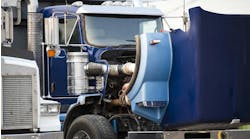As this article is being written, the Truck Blue Book staff is awash in the myriad details of hosting the 23rd Annual Truck Blue Book Conference, which attracts the industry's leading used-truck professionals to Las Vegas.
The other day, however, I took a break from the frantic pace and demands of conference preparation to attend a 15th Anniversary Open House at a local independent used-truck dealer. While there, I ran into a number of colleagues from around the country that I hadn't seen in a while. Talking to them again reminded me of the value of the professionals in this business.
When people purchase new trucks, they frequently want to know what a particular engine, transmission, etc. will add to the trade-in value of the vehicle. Unfortunately, the person they're most likely to ask about the “blue book value” of a particular component or option is the person selling them the new truck.
THOSE WHO COUNT
The people who really know used equipment and how “new” technology impacts blue book value — used-truck managers and their staffs — are rarely invited into the conversation when people are buying new vehicles.
Which is somewhat ironic, since the used-truck managers are the ones who report sales to the Truck Blue Book and make suggestions about which options and components add value and which reduce value. They play a critical role in determining the market value of used vehicles, and thus what we publish in the Truck Blue Book.
Fleets are known as early adaptors of new technology, but without a relationship with that “used-truck guy” just down the road, added value might not be realized on trade-ins.
As real-world users, fleets can take the lead in greatly enhancing used-truck managers' knowledge of new technology and components — and perhaps the blue book value itself — if they cultivate relationships with used-truck professionals.
INSIDE SCOOP
It's been my experience that the people selling the components or new technology generally don't visit the used-truck department. Instead, they call us at the Truck Blue Book to find out what a particular added value might be.
While it's exciting and a privilege to get information about new and emerging technology, what we at the Truck Blue Book really want is realistic information from used-truck dealers about the impact of those “new” options on the value of a used truck down the road.
For the most part, however, it seems that OEMs have left them in the dark. It's difficult for a used-truck manager to place a value on an item if he can't get a brochure, let alone the kind of dedicated product training that new-truck salespeople have access to.
One solution is for fleets to insist on involving the used-truck manager in the overall transaction. The value-adds will reach the Truck Blue Book database more quickly since used-truck dealers not only report sales numbers, but also participate in our Advisory Council.
We like to use our annual Truck Blue Book Conference as a venue for giving used-truck managers more information about new technology and components by bringing in technical experts in a number of different areas. But nothing is better than an ongoing relationship with your used-truck manager.
The Used Truck Association, which provides industry-specific training, as well as a code of ethics, also contributes to the professional development of these dedicated used-truck salespeople.
Some might call it a “soft” value, but I encourage you to improve your relationship with both used-truck managers at franchised dealers and the independent used-truck dealers. These professionals impact the value of used trucks every single day. Working more closely with them could mean reaping dividends on the value of your equipment when it comes time to trade it in.


